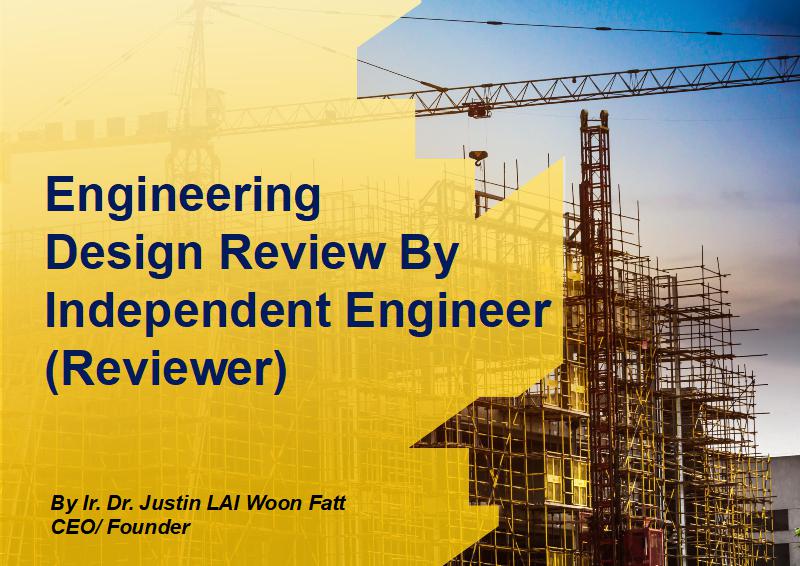Author: Ir. Dr. Justin LAI Woon Fatt | 24 December, 2021
INTRODUCTION
Independent Engineer Review refers to the documented evaluation of the structural design concept, details and documentation by a Reviewer based on examination on the complete structural design documents prepared by the First Engineer or Client before handing over the documents for the construction stage. Hence, an experienced engineer who has entitled Professional Engineer with Practising Certificate (PEPC) and does not involve in design preparation can be appointed as a Reviewer.
The purpose of independent engineer review is to identify the possible risk in structural design and minimize them to avoid any negative impact to the public and environment. Thus, PEPC plays a crucial role in reviewing the structural design concept and detail. The evaluation of the documents must determine the safety and consistency of structure and whether it complies with the relevant guidelines, code of practice, and design requirements. In fact, the independent engineering review is an additional assessment of the structure. Therefore, the opinions/ comments from the Reviewer can be used as a suggestion/ reference for the Client or First Engineer.
Should the Client intend to accept the opinions/ comments of the Reviewer, he/ she shall get the consent from the First Engineer first, due to the First Engineer shall be liable to the full responsibility. Then only the First Engineer to include the amendment accordingly and proceed with the submission. If the First Engineer disagree with the opinions/ comments, he/ she may get the confirmation letter from the Client to omit the parts of works, or up to the extent of withdrawal as a Submitting Engineer. The new engineer in charge shall responsible to the omitted works in accordance with the procedures outlined in BEM Circular No. 008. Thus, it is important that all parties (Client, First Engineer, and the Reviewer) communicate well and reach a mutual agreement for the success of the project. Nevertheless, reviewing should not result in a PEPC intruding or taking over another’s work, as stated in Regulation 31 of the Registration of Engineers Regulations 1990 (Revised 2015).
SCOPE OF INDEPENDENT ENGINEER REVIEW [1]
The scope of independent engineer review is to evaluate the design concept and detail of the project before submitting the document for construction purposes. Although the Reviewer is professional and experienced in design, he/ she may still need to proceed with calculation and software modelling to ensure the design meets the requirement. Therefore, the Reviewer is able to provide suggestions and advice if human errors happened. The scope of reviewing work can be summarized into these categories: –
- Engineering design
- Engineering systems
- Choice of materials
- Method of construction
- Cost optimization
- Safety review
- Stability review
- Any other aspects that the Client deems necessary
EXTENT OF INDEPENDENT ENGINEER REVIEW [2]
The extent and level of examination vary depending on the experience of PEPC and the complexity and risk associated with the project. The Reviewer shall examine the design of the permanent works thoroughly enough to judge whether the design is suitable for the intended purpose based on the scope of work agreed with the Client. Re-evaluation shall be conducted should the Reviewer’s evaluation indicates that there may be issues with the design. A documented evaluation report about the findings on the First Engineer’s submitted analysis and design shall be finalized and delivered by the Reviewer before construction starts. The Client may also extend the scope of work to the Reviewer in terms of examining the temporary works and construction supervision.
BENEFIT OF INDEPENDENT ENGINEER REVIEW
- Detection of Design Errors
The Reviewer may detect any possible human errors and design errors made by the First Engineer. The common mistakes include under design, overdesign, and incorrect implementation of the engineering systems. - Proposed of Alternative Engineering Solution
The Reviewer may provide alternative engineering suggestions and advice for concept, design, and engineering systems to improve the cost-effectiveness of the project. With the independent engineer review, human errors such as outdated engineering systems and insufficient design consideration can be prevented.
CONCLUSION
In short, although reviewing is generally not a compulsory process and it’s called for by the Client at the design and/ or constructions stage, it is highly recommended to engage a Reviewer to review the engineering design as part of the technical due diligence process to ensure a practical, safe and cost-effective design. The mistakes that commonly happen are human errors in the designing and selection of engineering systems. Hence, a Reviewer can help the Client to detect flaws, errors, and omissions. Professional suggestions and advice will be provided by the Reviewer after the reviewing exercise. Client and First Engineer have the decision to accept the advice or maintain the status quo.
Ir. Dr. Justin LAI Woon Fatt
CEO/ Founder
IPM Group
References:
[1] Board of Engineers Malaysia. (2021). Circular No. 010 Checking/ Reviewing the Work of Another Engineer.
[2] Engineers & Geoscientists. (2018). Documented Independent Review of Structural Designs Version 1.4 [E-book]. Engineers & Geoscientists British Columbia.

